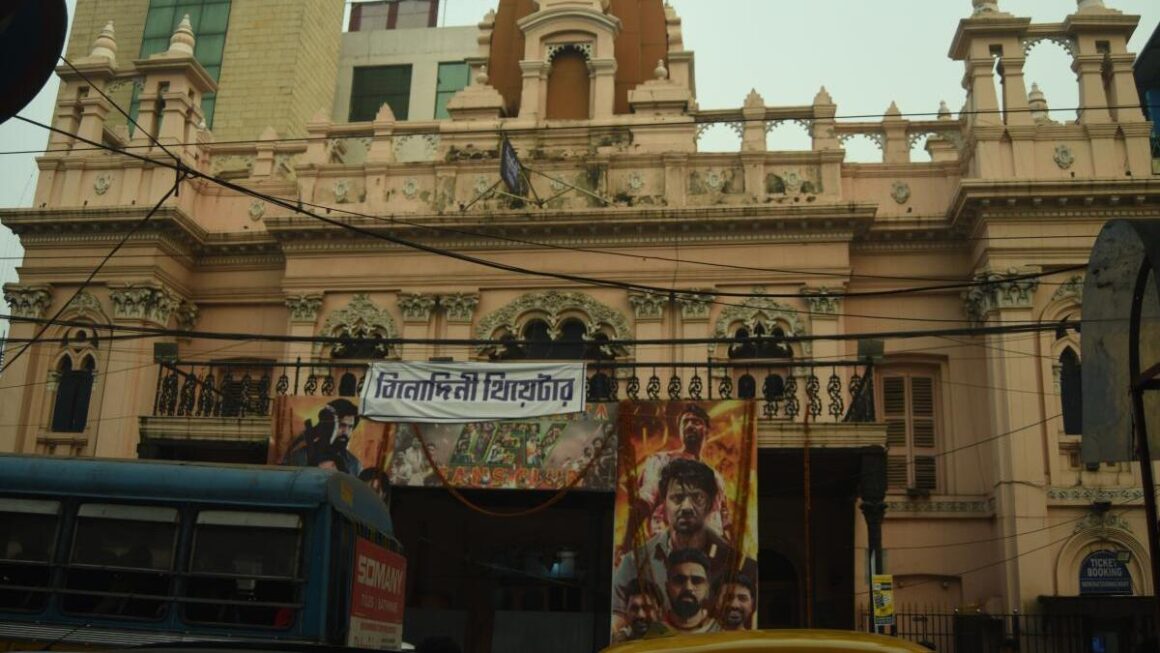The iconic century-old Star Theatre, standing tall and ornate at the crossing of Aurobindo Sarani and Bidhan Sarani in North Kolkata as a monolith of Bengal’s historic theatre traditions, now carries a different name plaque — ‘Binodini Theatre’.
A few days after West Bengal Chief Minister Mamata Banerjee’s December 30 announcement to rename Star Theatre to Binodini Theatre, all banners and plaques at the auditorium were promptly replaced to reflect the new name. While this change might seem innocuous to some, it is considered by many in Bengali’s theatre circles as historically significant — a long overdue reparation to the 19th-century theatre performer Binodini Dasi.
According to author, theatre researcher and practitioner Suddhasatya Ghosh, the original Star Theatre, established in 1883 at 68, Beadon Street and demolished and relocated by 1930, was supposed to be named after Binodini.
“Theatre veterans of the early 19th century, like Girish Ghosh, Amritalal Basu, Ardhendu Shekhar Mustafi wanted to practise Bengali theatre autonomously, outside of zamindari patronage which was the norm before that,” Mr Ghosh said. “So they approached Binodini to court Punjabi businessman Gurmukh Rai and help fund a commercial theatre space in the heart of the city.”
He added that female theatre practitioners at the time were primarily sex workers, and would be supported as thespians by their wealthy patrons. Between the 1870s and 1880s, Binodini became a celebrated and widely popular thespian, known for her acting, singing, and dancing, and whose name alone could draw huge crowds to watch Bengali plays in Kolkata.
‘Binodini started theatre in her teens. She had a paramour she wanted to marry, but the likes of Girish Ghosh convinced her to court Mr Rai instead, who they believed could help establish an autonomous theatre space,” Mr Ghosh said. “The promise made to Binodini, however, was that the auditorium would be named after her — B Theatre or Binodini Theatre.”
He added that not only did Binodini sacrifice her love affair to help fund the theatre at Beadon Street, but she also did physical labour to help construct the auditorium.
The same sentiment was echoed by Abanti Chakraborty, who co-wrote and directed the contemporary Bengali play, ‘Binodini Opera’, a tribute and retelling of Binodini’s life story.
However, when the auditorium was finally registered in March 1883, it was named Star Theatre instead of B Theatre or Binodini Theatre, unlike what was promised to her.
“She was told that the audience would not want to watch theatre at a space named after a sex worker. Binodini felt betrayed and humiliated. This is one of the reasons she retired from theatre very early, by the age of 24,” said Mr Ghosh.
In her Bengali autobiography Amar Katha (My Story), Binodini Dasi dedicated a chapter to Star Theatre. Recalling the moment she realised it had not been named after her, she wrote, “It felt like a hundred assaults on my heart, I could not speak for a while… I wondered if their affection for me was a pretense just to get their work done through me.”
However, Star Theatre slowly declined in operations and was eventually sold off in before 1888. After that, Mr Ghosh said, the auditorium at Beadon Street was renamed and restarted multiple times, as ‘Emerald’, ‘City’, ‘Kohinoor’ etc., but was finally razed down at the beginning of 1930 when Central Avenue was being built.
Meanwhile, the brand ‘Star Theatre’ started afresh in 1888 as a new auditorium at the intersection of Bidhan Sarani and Aurobindo Sarani, where it now stands as Binodini Theatre.
Today, the newly renamed Binodini Theatre operates as a movie hall and houses an art gallery and amphitheatre at the backside, also named after Binodini Dasi. In ticket booking sites and search engines online, Star Theatre now comes up as Binodini Theatre.
The earlier location at 68, Beadon Street, has now become home to a shabby eatery, a shop selling tea leaves, and a small paan store.
“Binodini performed extensively for about a decade. Her sacrifices and her work at that time are instrumental in bringing Bengali theatre to where it is today, especially with regard to female participation in theatre,” he added.
The same sentiment was echoed by Abanti Chakraborty, who wrote and directed the contemporary Bengali play, ‘Binodini Opera’, a tribute and retelling of Binodini’s life story.
“Binodini’s contribution to Bengali theatre is immeasurable. It is because of her, and other female theatre practitioners of that time, that women like me can practice theatre now,” Ms Chakraborty said.
However, both Mr Ghosh and Ms Chakraborty agree that renaming Star Theatre after Binodini accomplishes little in paying tribute to her theatre legacy.
“Firstly, this was not the Star Theatre established by Binodini, Girish Ghosh and others at Beadon Street. That no longer exists, and Binodini was not related to the one established the second time,” Ms Chakraborty said. “Moreover, it is a movie hall now, not a theatre space.”
According to her, establishing a new auditorium in Binodini’s name would have done more to preserve her legacy and help contemporary Bengali theatre thrive.
“The Star Theatre we know now, has a century-old history of its own, despite not being related to Binodini. Renaming this one, instead of starting a new auditorium, also erases Star’s own legacy,” Mr Ghosh said. Like Ms Chakraborty, he reiterated that a new theatre space could have helped pay homage to the actor and revive current-day Bengali theatre.
Published – January 11, 2025 03:31 pm IST


Leave a Reply